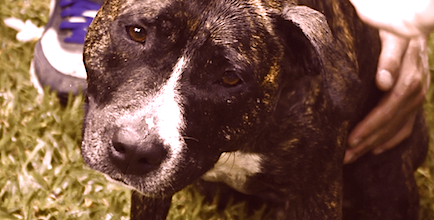No, Most Veterinarians Are Not Trying to “Upsell” Their Clients
Your vet wants to help you and your pet in times of crisis, and this entails making tough decisions together. Here’s the truth about veterinary upsells.

Years ago, I received a nasty letter from a client, claiming that another veterinarian was trying to upsell her.
“Upsell?” I pondered.
Turns out there was a pretty stinky ABC 20/20 report back then — headlined “Some Veterinarians Sell Unnecessary Shots, Tests to Make Extra Money, Says Former Vet” — that was scaring people into believing they were victims of rotten veterinarians who were trying to pad vet visits with unnecessary procedures.
People were upset. That 2013 report by ABC featured a Canadian ex-veterinarian, Andrew Jones, who forfeited his veterinary license to run a for-profit website.
First red flag? ABC had to go to Canada to find a vet to talk dirty.
Second red flag: He was no longer a vet.


Don’t leave your pet’s safety to chance
Sign up for Petful recall alerts today.

“Gotcha” Journalism
Many of you may know Dr. Marty Becker, DVM. Appearing on Good Morning America many times over the years, Dr. Becker agreed to be interviewed for the 20/20 piece believing the interview would support his “enthusiastic, honest and proud efforts to promote veterinary medicine and optimal health care.”
Dr. Becker had no idea, he said, that it was going to be a “gotcha” kind of piece featuring this ex-Canadian vet. He was shocked at how the program twisted and edited his responses.
Five days after the segment ran, Dr. Becker announced he was ending his long-term relationship with ABC.
When asked about the leading questions and tone of the piece, Dr. Becker said, “Honestly, I left the interview feeling I’d done a really good job…. I felt my job was to stand up proudly and defend a profession that I’m proud beyond measure to be part of.”
Upselling or Upsetting?
Ex-vet Andrew Jones alleged that some veterinarians push procedures that are not needed, with veterinary dentistry being the equivalent to the fast food industry’s “Do you want fries with that?”
So, like eating those fatty, salty fries that aren’t good for any of us, Jones was saying your dog doesn’t need that recommended dental.
Along with dental procedures, Jones alleged that surgically removing lumps and giving excessive vaccines are examples of upsells that many pets do not need.
The information about dentals and surgical procedures was misleading, and the 20/20 segment was pretty bad journalism overall. The veterinary community was in an uproar.
One Bad Apple Shouldn’t Ruin the Bushel
Every profession has some unseemly apples in the bucket, and ABC sensationalized this.
I first wrote this response article in 2014, and recently this article has been updated substantially.
In the years since then, I sold my independently owned, rural veterinary practice and have been working as a relief vet in the New York City metro area. The NYC area has huge demographic differences. There are people with money for their pets, as well as lots and lots of people with no money for their pets — none. They don’t have enough money for themselves.
I have worked in small multivet practices but have never worked on commission. My income as a vet has never been directly tied to sales and procedures. I have always advised my clients to do what I think is best for their pet’s health, and I don’t benefit financially from what they decide to do or not to do.
Below, I want to zero in on how most general practice veterinarians deal with their clients, care for their patients, think about their clients’ pocketbooks — and why many of us have a hard time going to sleep at night.
Welcome to My Real World
I talk with a lot of veterinarians each week, sharing cases and researching online with an expansive group of vets.
This means I consult on the Veterinary Information Network (VIN) with many general practitioners and specialists. I will often call a particular specialist before I refer an animal to that doctor. We are always talking about what a pet needs to either save their life or increase their quality of life — not trying to figure out ways to generate unnecessary procedures.
The vast majority of a veterinarian’s income doesn’t depend on how many unnecessary procedures they do. Instead of “pushing” procedures, vets are trying to make sick pets better.
That means working with pet parents and their limited budgets. More veterinary hours are spent on finding ways to help people pay for the stuff their animals need than you could ever imagine.
One of the biggest frustrations vets have is wanting to give pets great care, and learning that their humans can’t afford it or won’t pay for it. Unlike the 20/20 portrayal, many general practice veterinarians spend hours trying to save their clients money or find a way to help that client pay for the necessary care their pet needs — not padding bills with bells and whistles.
Every day, I go over multiple options with clients facing tough decisions. I try to explain how we can get from point A to point B in diagnosing and treating an illness without sending them to the poorhouse.
Instead of actually doing veterinary medicine, I spend most of my time giving my clients options and figuring out how to make economical choices.
I can’t just order the necessary blood work, for example, in many cases. I have to go over the costs. Many times, I have to pick and choose — and do what is not optimal.
What clients ask (a sampling):
- What will we learn from the blood work, and is it really necessary?
- What is the cheapest way to get the needed information?
- Can’t we test for that later?
- Is it necessary to check out the heart murmur before surgery?
- What is the most economical way to do that?
- Will you do the surgery without checking the heart murmur?
- Does the cat really need the IV fluids?
- Will the cat get better without fluids?
- Can’t you tell what’s wrong without any tests?
- Are the dog’s teeth really bad?
- Is that a bad tumor or not?
With pressing issues like these, the last thing I’m thinking about is trying to make my clients pay for unnecessary services.
Please keep in mind that the same client who often gives us grief about what something costs, or thinks that blood work may be an unnecessary expense, will also be the first to point the finger if something goes wrong or is overlooked.
To practice even decent medicine, most vets have to pick and choose tests, cut costs, give away professional services, and give away hours and hours of their time just to be able to sleep at night. Trying to deliver safe and sound medicine and surgery within our clients’ means is probably the most trying part of our jobs.
Corporate Chains? That’s a Different Story.
I think many of the “upselling vet” theories have gotten more traction in recent years because of the rise of veterinary corporate chains, where the bottom line is the most important thing to the corporate bigwigs.
In fact, vets who work in some of these hospitals share these thoughts exactly. These vets are being pressured to upsell by corporate management, and they don’t want to. It adds even more stress to their already stressed-out professional lives.
Think of the younger vet coming out of school with enormous debt. She is being paid less than any other medical expert in other fields with similar expertise, negotiating how to present options to pet parents on how best to treat their pet, getting told by the client that they have no money for even the basic workup on the pet — and then she is being raked over the coals by management because she isn’t generating enough income for the hospital, never mind her own salary, which isn’t enough to meet her loan payments that month.
Sadly, that is the more common scenario in many vet practices today.
Over 20 years ago, an independent study of American professions found that veterinarians were among the most trusted professionals across the board. Public opinion has changed. The veterinary profession is not as trusted as it once was, and I believe this is in large part due to the rise of the corporate veterinary structure.
Next, as this article continues, I want to talk about how discussing treatment options can be a tough conversation between vets and clients. Why does it feel like your vet is giving you so many options?

Picking the Right Treatment
Clients can get confused, upset, frustrated and even angry when their vet puts all treatment options on the table.
Full disclosure of all medical choices available to you, however, is the ethical thing to do.
Discussing all possibilities and treatment modalities is exactly that — a discussion. A person should not make decisions about their own health or the health of their pet without full knowledge of options.
So here’s a hypothetical pet scenario: Say your cat has an undiagnosed vomiting problem, a common feline ailment.
After some diagnostics and medical attempts that have not solved the vomiting problem, I could recommend the cat undergo exploratory surgery. But I should also tell the person that endoscopy, a less invasive procedure, is available and might save the cat from undergoing a full exploratory surgery.
Both procedures, what they can or can’t reveal, the pros and cons, and certainly costs involved should all be discussed. Then and only then should we come to a decision.
Continual advances in veterinary medicine save more animal lives, enable us to treat things we could never treat before and give pets longer, happier lives.
But all these advances complicate things — more diagnostic and treatment options or referrals to specialists are more expensive.

Cost Is a Consideration
Here’s another example: Aggie, the 15-year-old cat, is diagnosed with hyperthyroidism, a common condition in senior cats.
There is medication and/or diet to help this problem — and then there’s radioiodine (I-131) therapy, the gold standard, which entails just one visit to a specialist who administers the radioiodine and a short hospital stay for Aggie.
This procedure carries a high cure rate and little risk, but the price tag is hefty: over $1,000.
Aggie’s caregiver might choose the less expensive treatment option. But when Aggie is not responding that quickly or is having side effects from the medication, I must mention the radioiodine option again.
Aggie’s human may say they just can’t do it financially and get mad.
This is not a time for anger but more discussion. Outlining all options again, with associated costs, is the right thing to do.
We can discuss the risks of not treating Aggie, an acceptable option in some cases. We can compare the costs of the medications and monitoring (rechecks and blood tests) versus the radioiodine treatment based on a reasonable life expectancy for Aggie.
This may seem coldhearted, but it’s actually warmhearted: If Aggie is in good health right now and lives to be 18 — a reasonable life expectancy — then the radioiodine treatment could actually save Aggie’s family money and aggravation, and maybe it can be made affordable.
Giving up on difficult discussions too early can be dangerous for your pet and render you unhappy in the long run.
Listen to this vet’s view of communication skills:

Stay Focused
These tough discussions can make a person’s head spin and lead to anger on the client’s part. As veterinarians, we don’t want to upset clients — we want to make them fully aware of all the options.
I can promise you that most vets worth their salt aren’t trying to upsell you on anything. We’re not talking about buying a dishwasher here. We’re talking about the life and well-being of your pet, and you are in an emotional state, as anyone would be.
This is a tough balancing act, and you and your vet are on the tightrope of decisions.
You need to be informed; you must make decisions together; and you should not be made to feel guilty, frustrated or angry. You can be sad that your pet isn’t completely healthy, but now is the time for you to be the best caretaker you can be.
Full disclosure all the time is a great motto to live by. Options should be informative, not frustrating. Having the knowledge you need to move forward with your pet’s health options should help you with your journey.
References
- Rhee, Joseph, et al. “Some Veterinarians Sell Unnecessary Shots, Tests to Make Extra Money, Says Former Vet.” ABC News. Nov. 22, 2013. https://abcnews.go.com/US/veterinarians-sell-unnecessary-shots-tests-make-extra-money/story?id=20967672.
- “Veterinary Community Defends Profession After ABC’s 20/20 Report.” American Animal Hospital Association. Nov. 26, 2013. https://www.aaha.org/publications/newstat/articles/2013-11/veterinary-community-defends-profession-after-abcs-2020-report/.
- “Financing Your Veterinary Medical Education.” American Veterinary Medical Association. https://www.avma.org/membership/SAVMA/financing-your-veterinary-medical-education.







